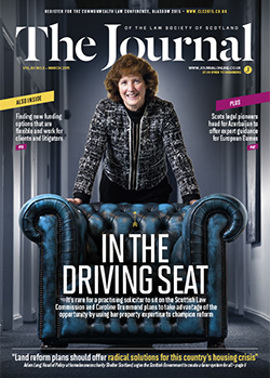ABS: time to accept the evidence

“Change is such hard work.” (Billy Crystal)
Recently, I was delighted to be invited to join a panel at the upcoming Commonwealth Law Conference to discuss with colleagues from Canada, Australia and Ghana the question, “Should non-lawyer ownership of law firms be endorsed and encouraged?”
In contrast to England & Wales, not to mention Australia and imminently Canada, the prevailing view in Scotland is that lawyers and non-lawyers are not better together, unless the former are in command, and the latter restricted to 49% of the enterprise. Indeed, judging by their rhetoric, to some of our profession a law firm owned by non-lawyers is the work of the devil.
As I was beginning to prepare for the conference, I had a chance opportunity to meet one of Satan’s emissaries, Jordan Mayo, the managing director of Smedvig Capital, which owns English conveyancing provider myhomemove. Smedvig is a venture capital fund set up to manage the private wealth of the family owners of the Smedvig shipping line. It invests in a range of businesses which, apart from myhomemove and its sister, the probate provider Kings Court, have no connection with conveyancing, but much to do with innovation.
The story of myhomemove is instructive. Founded in 2001, Land Registry data confirm it is now the largest conveyancing provider in England & Wales. It turns over £50 million a year and acts in more than 40,000 transactions. It has won a string of industry and consumer awards for the quality of its service, delivered through a subsidiary, Premier Property Lawyers, whose board has not one solicitor, and whose staff are licensed conveyancers.
Speaking at length with Jordan Mayo, it was clear that myhomemove’s success is no accident. It is founded on a clear strategy, implemented through long-term investment in new process, technological innovation and skills in a wide range of disciplines from finance, sales and marketing to project management and operational risk.
That success is echoed in business legal services by Peninsula, the employment law provider. It was founded in 1983, before ABS was a twinkle in the eye, by the Done brothers, owners of bookmakers Betfred, after a bad experience left them with a sense of injustice and a bill of £11,000. It is the UK’s largest employment law, health and safety consultancy, with a turnover of just under £70 million. It is active and successful on both sides of the border. Its model, a package of basic support for employers, paid for by an annual retainer, backed up with insurance against the risk of tribunal claims, has now been copied by many law firms.
These are very different businesses, but have at least two things in common. First, though they are market-leading providers of legal services and are regulated (wholly in the case of myhomemove, partly in the case of Peninsula), no Law Society is involved. Secondly, there has never been any question of them posing a risk to the public.
Can law firms compete successfully with these juggernauts? Yes, of course. They can and they do; but not all of them. The Darwinian process now under way will continue to evolve, rewarding those who adapt, while diminishing or extinguishing the rest.
Presented with successes such as these, should we “endorse and encourage” non-lawyer ownership of firms? This is for society, not just the profession to decide. As has been observed, neither the traditional nor the new models are exclusively utopian or dystopian. But if the guiding principle is that the public interest is paramount, it is hard to see the case for obstructing able, ethical providers from competing. The current barriers to entry need to be dismantled here, as they have elsewhere.
And while effective public protection is fundamental, there needs also to be an end to the bogus warnings from self-styled guardians of probity within our ranks that if a business in Scotland controlled by anyone but solicitors is allowed to provide legal services, catastrophe will ensue. The traditional profession will match new entrants by adapting its business model, investing in the necessary skills and raising its game, not by scaremongering and being wilfully blind to the evidence.
In this issue
- Structured settlements: worth a look?
- Unfairness defined
- Our digital afterlife
- Powers of attorney: full instructions?
- Writings redefined
- Reading for pleasure
- Opinion: Adam Lang
- Book reviews
- Profile
- President's column
- Roll up to register
- People on the move
- Tax plan's on track
- Lease of life
- No win, no fee: no problem?
- Ready to go to court?
- Taking on the expert
- Pensions: keep up with the shake-up
- Equity investment and law firm funding
- Entitled to rely
- See-through setups
- Copyright: defining the boundaries
- Tenancies: the shape of things to come?
- A career taking off
- The system is sound, but...
- Law reform roundup
- Obituary: Leslie Cumming
- From the Brussels office
- From the Clyde to the Caspian
- Some common misconceptions
- Ask Ash
- Mediation: new options
- ABS: time to accept the evidence
- It is OK to change your mind
- Sizing up the class of 2018






